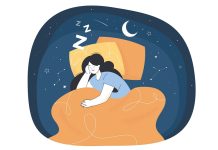
In a recent study, researchers found that gentle sound stimulation—such as the rush of a waterfall, could help people sleep and boost memory.
Gentle sound stimulation is synchronized to the rhythm of brain waves.
They can significantly enhance deep sleep in older adults and improve their ability to recall words.
The study was conducted by researchers from Northwestern Medicine.
Deep sleep is critical for memory consolidation. But beginning in middle age, deep sleep decreases substantially, which scientists believe contributes to memory loss in aging.
This study targeted older individuals—who have much more to gain memory-wise from an enhanced deep sleep—and used a novel sound system that increased the effectiveness of the sound stimulation in older populations.
In the study, 13 participants 60 and older received one night of acoustic stimulation and one night of sham stimulation.
The people were recruited from the Cognitive Neurology and Alzheimer’s Disease Center at Northwestern.
The sham stimulation procedure was identical to the acoustic one, but participants did not hear any noise during sleep.
For both the sham and acoustic stimulation sessions, the people took a memory test at night and again the next morning.
The team found that recall ability after the sham stimulation generally improved on the morning test by a few percents.
However, the average improvement was three times larger after pink-noise stimulation.
The degree of slow wave sleep enhancement was related to the degree of memory improvement, suggesting slow wave sleep remains important for memory, even in old age.
The study used a new approach, which reads an individual’s brain waves in real time and locks in the gentle sound stimulation during a precise moment of neuron communication during deep sleep, which varies for each person.
During deep sleep, each brainwave or oscillation slows to about one per second compared to 10 oscillations per second during wakefulness.
The team developed an algorithm that delivers the sound during the rising portion of slow-wave oscillations. This stimulation enhances synchronization of the neurons’ activity.
After the sound stimulation, the older participants’ slow waves increased during sleep.
Although the scientists have not yet studied the effect of repeated nights of stimulation, this method could be a viable intervention for longer-term use in the home.
The study is published in Frontiers in Human Neuroscience.
Copyright © 2018 Knowridge Science Report. All rights reserved.
Source: Frontiers in Human Neuroscience.



